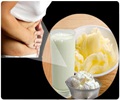Dairy imports containing at least 15 percent milk powder will have to undergo strict testing, European Union regulators have announced after concluding that food containing tainted milk powder from China may well be circulating in Europe and putting children at risk.
The action, announced by the European Food Safety Authority and the European Commission, significantly expands the potential geographic reach of a milk adulteration scandal in China to now include a range of foods sold around the world, reports the New York Times.The Europeans said cookies, toffees and chocolates were the major concerns.
The World Health Organization and UNICEF also expressed concern on Thursday about the Chinese milk contamination and the implications for other foods.
In the United States, some consumer groups called on the Food and Drug Administration to restrict imports of foods that may contain suspected dairy ingredients from China.
In China, milk products contaminated with the industrial chemical melamine have sickened more than 50,000 young children in recent weeks and created a spiraling government scandal.
While it is illegal to import dairy products and baby formula from China into the European Union, European nations can and do import many processed foods containing milk powder as an ingredient that are manufactured outside of Europe. Such products could contain milk powder from China.
Advertisement
In the United States, some consumer groups called for stricter regulation as well.
Advertisement
This includes 293,000 pounds that were imported in July. The Food and Drug Administration did not immediately return calls for comment on Thursday.
Melamine is a chemical used in plastic manufacturing that can be added to foods to artificially increase their protein content in testing. Its presence was detected in pet foods originating from China last year.
Even if present in foods in Europe, milk powder contaminated with melamine is not likely to cause the kind of public health disaster that is occurring among Chinese infants.
In China, babies drank contaminated milk powder as their sole source of nutrition for weeks if not months, and a handful have died.
Source-ANI
RAS/SK















